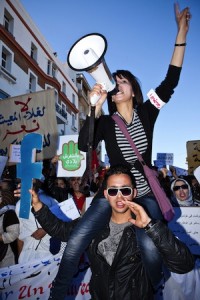This post is part of our special coverage Morocco Protests 2011 and Global Development 2011.
The Arab spring has brought about enthusiasm for change. As the walls of fear start crumbling, people feel empowered and have started taking matters into their own hands. Social media is serving as a medium for a public debate which was for long the exclusive preserve of a ruling elite.
In Morocco, one of the central themes for change is Education. Houda C. (@Houdac), a blogger [Fr], initiated a debate on Twitter, under the hashtag #EducMa. She invited people to talk about the reforms they want to see implemented to fix an education system considered a failure by many. Houda C. compiled the responses she received throughout the discussion she helped generate and reported back on her own blog [Fr]. She writes:

Young Moroccans keep on demanding constitutional reform, Rabat, Morocco. Image by Zacarias Garcia, copyright Demotix (20/03/2011).
De fil en aiguille ce ‘débat’ s’est transformé en brainstorming géant, où certains proposaient des idées disparates et autres se construisaient de petits groupes virtuels pour débattre d’une idée particulière.
One of the most controversial points raised was the teaching of languages at school. Darija, the Moroccan dialect, is not taught in classrooms and the Amazigh language, spoken by the large Berber section of the population, is hardly recognized in the educational curriculum.
Houda C. notes:
Les avis ont été très divergeant concernant la ou les langues d’enseignement (…) mais on s’est attelé à faire propositions diverses avec un semblant de consensus :
- La nécessité de proposer plus de choix à l’élève / étudiant en termes de langues secondaires.
– L’homogénéisation de la langue d’enseignement entre le primaire, secondaire et supérieur. L’arabisation partielle a été notamment considérée comme l’une des sources de la faillite du système éducatif.
– Le changement de paradigme par rapport à la langue française. Pourquoi pas l’anglais, par exemple, en tant que deuxième langue ?
Opinions were very divergent over the proper language to use in the classroom, but they were coupled with various proposals upon which there appears to be some consensus:
- The need to offer more choice to pupils/students in terms of the secondary language
– The homogenization of the language of instruction from primary, secondary to higher education. The policy of Arabization of the curriculum was particularly regarded as one of the sources of the failure of the system
– The paradigm shift from French: Why not use English, for example, as a second language?
Here are some of the highlights of that debate:
The debate goes on and more topics are emerging. Houda C. writes:
Il y a quelques bonnes volontés qui se sont déjà proposées pour étendre la discussion, l’étoffer avec de prochains débats sur twitter ou ailleurs, et évidement documenter le tout afin de venir avec de réelles propositions de changement.
This post is part of our special coverage Morocco Protests 2011 and Global Development 2011.







4 comments
I think the idea to tweet in order to generate a debate was a great idea. When masses of people come together and discuss things for the common good, changes can eventually happen.